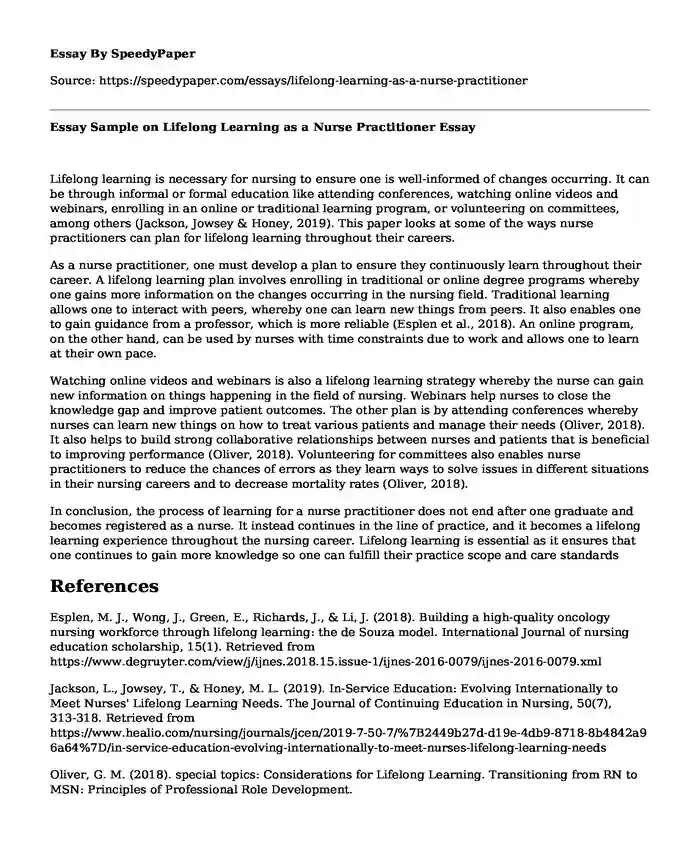
| Type of paper: | Essay |
| Categories: | Learning Profession Nursing care Special education |
| Pages: | 2 |
| Wordcount: | 463 words |
Lifelong learning is necessary for nursing to ensure one is well-informed of changes occurring. It can be through informal or formal education like attending conferences, watching online videos and webinars, enrolling in an online or traditional learning program, or volunteering on committees, among others (Jackson, Jowsey & Honey, 2019). This paper looks at some of the ways nurse practitioners can plan for lifelong learning throughout their careers.
As a nurse practitioner, one must develop a plan to ensure they continuously learn throughout their career. A lifelong learning plan involves enrolling in traditional or online degree programs whereby one gains more information on the changes occurring in the nursing field. Traditional learning allows one to interact with peers, whereby one can learn new things from peers. It also enables one to gain guidance from a professor, which is more reliable (Esplen et al., 2018). An online program, on the other hand, can be used by nurses with time constraints due to work and allows one to learn at their own pace.
Watching online videos and webinars is also a lifelong learning strategy whereby the nurse can gain new information on things happening in the field of nursing. Webinars help nurses to close the knowledge gap and improve patient outcomes. The other plan is by attending conferences whereby nurses can learn new things on how to treat various patients and manage their needs (Oliver, 2018). It also helps to build strong collaborative relationships between nurses and patients that is beneficial to improving performance (Oliver, 2018). Volunteering for committees also enables nurse practitioners to reduce the chances of errors as they learn ways to solve issues in different situations in their nursing careers and to decrease mortality rates (Oliver, 2018).
In conclusion, the process of learning for a nurse practitioner does not end after one graduate and becomes registered as a nurse. It instead continues in the line of practice, and it becomes a lifelong learning experience throughout the nursing career. Lifelong learning is essential as it ensures that one continues to gain more knowledge so one can fulfill their practice scope and care standards
References
Esplen, M. J., Wong, J., Green, E., Richards, J., & Li, J. (2018). Building a high-quality oncology nursing workforce through lifelong learning: the de Souza model. International Journal of nursing education scholarship, 15(1). Retrieved from https://www.degruyter.com/view/j/ijnes.2018.15.issue-1/ijnes-2016-0079/ijnes-2016-0079.xml
Jackson, L., Jowsey, T., & Honey, M. L. (2019). In-Service Education: Evolving Internationally to Meet Nurses' Lifelong Learning Needs. The Journal of Continuing Education in Nursing, 50(7), 313-318. Retrieved from https://www.healio.com/nursing/journals/jcen/2019-7-50-7/%7B2449b27d-d19e-4db9-8718-8b4842a96a64%7D/in-service-education-evolving-internationally-to-meet-nurses-lifelong-learning-needs
Oliver, G. M. (2018). special topics: Considerations for Lifelong Learning. Transitioning from RN to MSN: Principles of Professional Role Development.
Cite this page
Essay Sample on Lifelong Learning as a Nurse Practitioner. (2023, Apr 20). Retrieved from https://speedypaper.net/essays/lifelong-learning-as-a-nurse-practitioner
Request Removal
If you are the original author of this essay and no longer wish to have it published on the SpeedyPaper website, please click below to request its removal:
- Essay Sample Describing the Decontamination in Rural Hospital
- Essay Sample on Comparing the Education Systems in the US and China
- Free Essay about the Purpose, Methods Results, and Discussion of the Assigned Study
- Free Argumentative Essay on Smartphone Controversy
- Essay Sample: No Silver Bullet Article Summary
- Essay Example on Toyota Material Handling: Production From Start to Finish
- Free Essay - Popular Cultural Representation of the Human Body
Popular categories




